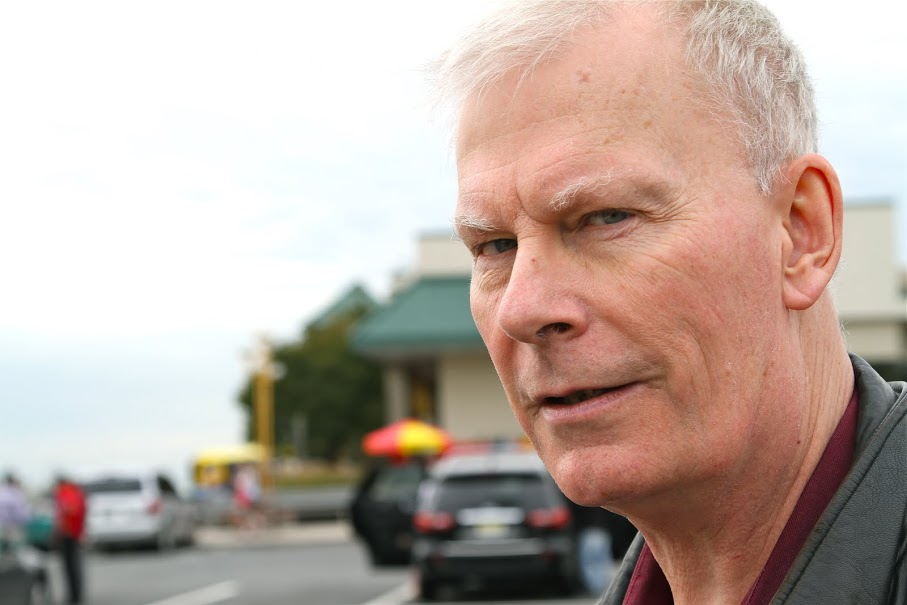Novelist James Grady Comes to the Gaithersburg Book Festival

By Karen O’Keefe
In a recent interview, novelist and multi-talented writer in other genres, James Grady said the Gaithersburg Book Festival, now in its sixth year, is evidence that the Washington, D.C., area has now emerged as a vibrant literary community.
It wasn’t always that way, he said.
“Writing can be a really lonely activity. And, for years, I barely knew any other fiction writers in the area. It could be very difficult to find other people to relate to.
“To watch the D.C.-area literary scene emerge has been a delight. We writers tend to dwell alone in dark rooms, so when we get the chance to celebrate the thing we do in public – the way we do at the Gaithersburg Book Festival — it is a very good thing.”
Master of the spy novel, and author of the best-seller, “Six Days of the Condor,” James Grady is a screen writer,  television script writer, short story writer, novelist and former journalist whose most recent novel, the thriller, “Last Days of the Condor,” was published February 14.
television script writer, short story writer, novelist and former journalist whose most recent novel, the thriller, “Last Days of the Condor,” was published February 14.
For fans of “Six Days of the Condor,” published in 1974 – and its 1975 movie offspring that starred Robert Redford: “Three Days of the Condor” – Grady’s newest novel is an espionage thriller that answers many of the questions about what happened to Condor, nee Ronald Malcolm, after the 1970s.
For new Grady fans, the novel is a fast-paced look at a hero facing the challenges of the national security state that is the U.S. in 2015.
A native Montanan, Grady has worked as a writer in the close-in Maryland suburbs of Washington, D.C., for nearly four decades. He first came to town in 1971, having won a college internship sponsored by Sears, Roebuck & Company, that landed him in the office of Senator Lee Metcalf (D-MT) just months before the 1972 Watergate break-in.
Although it was unusual for interns in the program to be placed with members of Congress from their home state, the Metcalf/Grady placement was a good fit and Grady thrived there.
It was a time when politics and secret plots must have seemed inseparable, and for young Grady, who’d been a dreamer and a storyteller since before he could read and write, it germinated the seeds of his first novel, whose plot unfolded in D.C.
After his first stint working in the Senate, Grady returned to Montana in 1973 to pen “Six Days of the Condor.” The young author’s first novel published the next year.
In 1974, Grady won a fellowship that landed him a second tour in the office of Senator Metcalf.
After leaving Metcalf’s office, Grady packed several years of solid investigative journalism onto his resumé, reporting on intelligence, organized crime and politics for Pulitzer Prize winning syndicated columnist Jack Anderson.
A prolific writer, Grady has authored more than a dozen novels, twice that many published short stories, and been a screenwriter and television scriptwriter.
Grady will speak in two venues at the May 16 Gaithersburg Book Festival. In the morning, he will participate on the “Richard Peabody Reader” panel, along with novelist Mary Kay Zuravleff, poet/novelist/journalist Rose Solari and publisher/editor/poet/and short story and novella writer Richard Peabody – a brilliant quartet of Washington’s finest writers. (10:15 a.m. to 11:05 a.m. in the Edgar Allan Poe Pavilion)
In the afternoon, Grady will speak more personally about his writing and about his most recent novel, “Last Days of the Condor.” (2:15 p.m. to 3:05 p.m. in the Dashiell Hammett Pavilion)
Grady says life as a spy in the intelligence community has both changed and stayed the same in the 40-plus years book-ended by his first Condor novel and his most recent Condor offering.
“I have a lot of experience and know significant numbers of individuals in that whole noire world,” he said. “Spies, cops, crooks – you name it – I know a lot of those people. They inform my fiction.”
Some things are the same as they were in the 1970s. “The guys who work for America, the good guys, have an incredibly difficult job keeping the country secure.
“And the guys who work against them – whatever their motivation – they are under a fair amount of stress too.
“There is loyalty among spies – but being a spy is about breaking someone else’s loyalty.”
What’s different in the intelligence community after nearly a half-century?
“When I published ‘Six Days of the Condor,’ we were deep in the Cold War and America’s enemies, for the most part worked within national borders – Communist China, Soviet Russia, the Warsaw Pact, some organized crime brushing up against politics – there was an established order that was easy to understand.
“What you have now is a far larger national security state than I could ever have imagined under Condor. The intelligence community is so huge, so vast and so complex – and technology has made it more so.
“Today, they are dealing, for the most part, with transnational actors like ISIS, Al Qaeda and – to some degree – the cartels.
“It is a much more confusing world with a much larger force of American good guys trying to keep us safe in that world.
“There is no separating espionage and spies and all that from international politics. What happens in Yemen, for example, in the next few weeks, is not going to be determined by our intelligence agencies – but hopefully our intelligence agencies can help guide us to the best course.”
On his life as a writer, Grady explains that he is just another regular guy. “We writers lead a pretty boring existence on the surface. I try to work it like a 40-hour/week job, in part, so I do not work myself into exhaustion because I am compulsively driven to work.
“In the morning I do tai chi. I take my wife to the gym, we come home and by an early hour in the morning, I am at my desk.
“We are probably like most folks who come to the Gaithersburg Book Festival. We do a lot of reading; we see movies, and we watch a lot of good television because, frankly, there is a lot of good television to watch.
“What I do for a living is what I would do for fun. It is both a passion and an evolving art. I work at it — and I think I get better every year.
“I love what I do – I love writing.”
Don’t miss James Grady on May 16 at the sixth annual Gaithersburg Book Festival.
Author photo by Joshua Wolff


